Related Research Articles
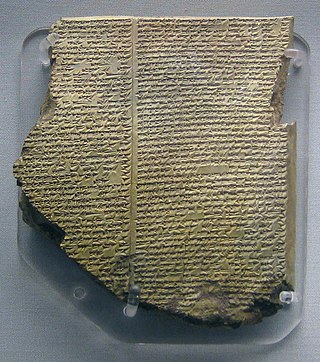
An epic poem, or simply an epic, is a lengthy narrative poem typically about the extraordinary deeds of extraordinary characters who, in dealings with gods or other superhuman forces, gave shape to the mortal universe for their descendants.
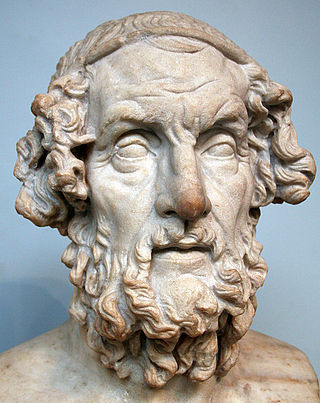
Homer was an Ancient Greek poet who is credited as the author of the Iliad and the Odyssey, two epic poems that are foundational works of ancient Greek literature. Homer is considered one of the most revered and influential authors in history.
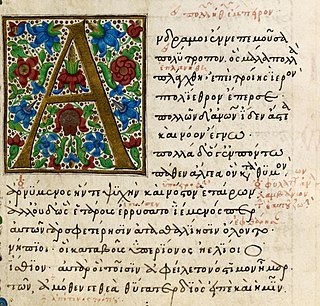
The Odyssey is one of two major ancient Greek epic poems attributed to Homer. It is one of the oldest extant works of literature still widely read by modern audiences. As with the Iliad, the poem is divided into 24 books. It follows the Greek hero Odysseus, king of Ithaca, and his journey home after the Trojan War. After the war, which lasted ten years, his journey from Troy to Ithaca, via Africa and southern Europe, lasted for ten additional years during which time he encountered many perils and all of his crewmates were killed. In his absence, Odysseus was assumed dead, and his wife Penelope and son Telemachus had to contend with a group of unruly suitors who were competing for Penelope's hand in marriage.
A simile is a figure of speech that directly compares two things. Similes are often contrasted with metaphors, where similes necessarily compare two things using words such as "like", "as", while metaphors often create an implicit comparison. However, there are two schools of thought regarding the relationship between similes and metaphors. The first defines them as opposites, such that a statement cannot be both a simile and a metaphor — if it uses a comparison word such as "like" then it is a simile; if not, it is a metaphor. The second school considers metaphor to be the broader category, in which similes are a subcategory — according to which every simile is also a metaphor. These two schools reflect differing definitions and usages of the word "metaphor" and whether or not it encompasses similes, but both agree that similes always involve a direct comparison word such as "like".

In Greek mythology, Patroclus was a Greek hero of the Trojan War and an important character in Homer's Iliad. Born in Opus, Patroclus was the son of the Argonaut Menoetius. When he was a child, he was exiled from his hometown and was adopted by Peleus, king of Phthia. There, he was raised alongside Peleus' son, Achilles, a childhood friend, who became a close wartime companion. When the tide of the war turned against the Achaeans, Patroclus, disguised as Achilles and defying his orders to retreat in time, led the Myrmidons in battle against the Trojans and was eventually killed by the Trojan prince, Hector. Enraged by Patroclus's death, Achilles ended his refusal to fight, resulting in significant Greek victories.

The Catalogue of Ships is an epic catalogue in Book 2 of Homer's Iliad (2.494–759), which lists the contingents of the Achaean army that sailed to Troy. The catalogue gives the names of the leaders of each contingent, lists the settlements in the kingdom represented by the contingent, sometimes with a descriptive epithet that fills out a half-verse or articulates the flow of names and parentage and place, and gives the number of ships required to transport the men to Troy, offering further differentiations of weightiness. A similar, though shorter, Catalogue of the Trojans and their allies follows (2.816–877). A similar catalogue appears in the Pseudo-Apollodoran Bibliotheca.

The Epic Cycle was a collection of Ancient Greek epic poems, composed in dactylic hexameter and related to the story of the Trojan War, including the Cypria, the Aethiopis, the so-called Little Iliad, the Iliupersis, the Nostoi, and the Telegony. Scholars sometimes include the two Homeric epics, the Iliad and the Odyssey, among the poems of the Epic Cycle, but the term is more often used to specify the non-Homeric poems as distinct from the Homeric ones.
An aristeia or aristia is a scene in the dramatic conventions of epic poetry as in the Iliad, where a hero in battle has his finest moments. Aristeia may result in the death of the hero, and therefore suggests a "battle in which he reaches his peak as a fighter and hero".

A rhapsode or, in modern usage, rhapsodist, refers to a classical Greek professional performer of epic poetry in the fifth and fourth centuries BC. Rhapsodes notably performed the epics of Homer but also the wisdom and catalogue poetry of Hesiod and the satires of Archilochus and others. Plato's dialogue Ion, in which Socrates confronts a star player rhapsode, remains the most coherent source of information on these artists. Often, rhapsodes are depicted in Greek art, wearing their signature cloak and carrying a staff. This equipment is also characteristic of travellers in general, implying that rhapsodes were itinerant performers, moving from town to town. Rhapsodes originated in Ionia, which has been sometimes regarded as Homer's birthplace, and were also known as Homeridai, disciples of Homer, or "singers of stitched lays."
Homeric Greek is the form of the Greek language that was used in the Iliad, Odyssey, and Homeric Hymns. It is a literary dialect of Ancient Greek consisting mainly of an archaic form of Ionic, with some Aeolic forms, a few from Arcadocypriot, and a written form influenced by Attic. It was later named Epic Greek because it was used as the language of epic poetry, typically in dactylic hexameter, by poets such as Hesiod and Theognis of Megara. Compositions in Epic Greek may date from as late as the 5th century CE, and it only fell out of use by the end of classical antiquity.

The Homeric Question concerns the doubts and consequent debate over the identity of Homer, the authorship of the Iliad and Odyssey, and their historicity. The subject has its roots in classical antiquity and the scholarship of the Hellenistic period, but has flourished among Homeric scholars of the 19th, 20th, and 21st centuries.

The historicity of the Iliad or the Homeric Question has been a topic of scholarly debate for centuries. While researchers of the 18th century had largely rejected the story of the Trojan War as fable, the discoveries made by Heinrich Schliemann at Hisarlik reopened the question. The subsequent excavation of Troy VIIa and the discovery of the toponym "Wilusa" in cuneiform Hittite correspondence has made it plausible that the Trojan War cycle was at least remotely based on a historical conflict of the 12th century BC, even if the poems of Homer remembered the event only through the distortion of four centuries of oral tradition.
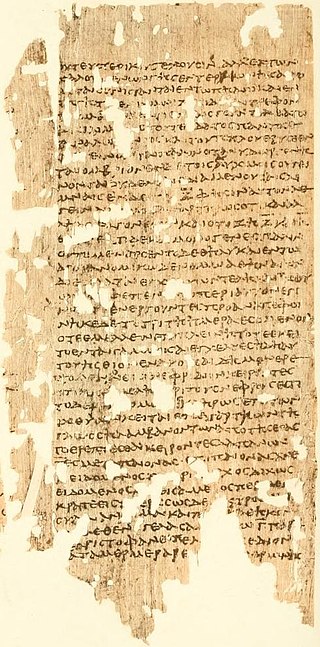
Homeric scholarship is the study of any Homeric topic, especially the two large surviving epics, the Iliad and Odyssey. It is currently part of the academic discipline of classical studies. The subject is one of the oldest in education.

The Greek word aoidos referred to a classical Greek singer. In modern Homeric scholarship aoidos is used by some as the technical term for a skilled oral epic poet in the tradition to which the Iliad and Odyssey are believed to belong.

Oral-formulaic composition is a theory that originated in the scholarly study of epic poetry and developed in the second quarter of the twentieth century. It seeks to explain two related issues:
- the process by which oral poets improvise poetry
- the reasons for orally improvised poetry having the characteristics that it does
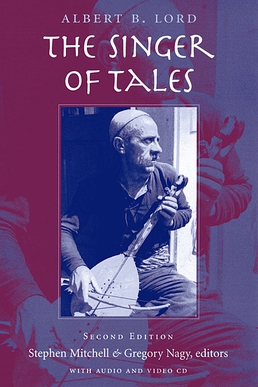
The Singer of Tales is a book by Albert Lord that formulates oral tradition as a theory of literary composition and its applications to Homeric and medieval epic. Lord builds on the research of Milman Parry and their joint work recording Balkan guslar poets. It was published in 1960.
In Greek mythology, Gorgythion was one of the sons of King Priam of Troy at the time of the Trojan War and appears as a minor character in Homer's Iliad. His mother was Castianeira of Aisyme.

The Iliad is one of two major ancient Greek epic poems attributed to Homer. It is one of the oldest extant works of literature still widely read by modern audiences. As with the Odyssey, the poem is divided into 24 books and was written in dactylic hexameter. It contains 15,693 lines in its most widely accepted version. Set towards the end of the Trojan War, a ten-year siege of the city of Troy by a coalition of Mycenaean Greek states, the poem depicts significant events in the siege's final weeks. In particular, it depicts a fierce quarrel between King Agamemnon and a celebrated warrior, Achilles. It is a central part of the Epic Cycle. The Iliad is often regarded as the first substantial piece of European literature.
Dennis Ronald MacDonald is the John Wesley Professor of New Testament and Christian Origins at the Claremont School of Theology in California. MacDonald proposes a theory wherein the earliest books of the New Testament were responses to the Homeric Epics, including the Gospel of Mark and the Acts of the Apostles. The methodology he pioneered is called Mimesis Criticism. If his theories are correct then "nearly everything written on [the] early Christian narrative is flawed." According to him, modern biblical scholarship has failed to recognize the impact of Homeric Poetry.
Homeric psychology is a field of study with regards to the psychology of ancient Greek culture no later than Mycenaean Greece, around 1700–1200 BCE, during the Homeric epic poems.
References
- ↑ Jones, Peter (2003). "Introduction: Similes". The Iliad. Translated by Rieu, E.V. Penguin UK. ISBN 978-0-14-192043-6.
- ↑ Shipp, G.P. (2007). Studies in the Language of Homer. Cambridge: Cambridge University Press. ISBN 0-521-03826-X.
- ↑ Iliad 11.292, 295 and 15.263
- ↑ Scott, William Clyde. The Oral Nature of the Homeric Simile . Leiden, Brill, 1974.
- ↑ "Apollo came like the night" – Iliad 1.47
- ↑ "as a bitch paces round her tender whelps...so growled his heart" – Odyssey 10.14
- ↑ On Homer's Similes. Eleanor F. Rambo. The Classical Journal, Vol. 28, No. 1. (Oct., 1932), pp. 22-31.